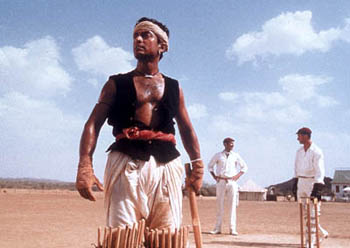![[Metroactive Music]](/music/gifs/music468.gif)
[ Music Index | Silicon Valley | Metroactive Home | Archives ]
 'Lagaan' puts cricket to music. Culture Vulture Do we like foreign music because it's good--or just foreign? By Gina Arnold DESPITE THE AWARDS and accolades it's received, including an Academy Award nomination for Best Foreign Language Film, it's hard to recommend the current Indian movie Lagaan (Once Upon a Time in India) in good conscience. It's an amazing Bollywood spectacle, complete with those wild lip-synched dance routines that look so cool and foreign to our jaded eyes. But it's also a musical, not a genre that many Americans go for these days. Lagaan is also a full four hours long, and the entire last half concerns a lengthy and intricate game of cricket, which most Americans don't know the rules to. Thus, telling people to go see it is a bit like telling people they ought to buy Lou Reed's Metal Machine Music. Sure, it was superinfluential in a way. It's also unlistenable. I think Lagaan would be hard for a lot of people to enjoy, even the 10-minute-plus musical sequences in which entire villages break into song and dance with solo interludes for various featured players: the love-struck couple, the cricket teams, the English maiden and the token Untouchable. I have finally been struck by World Beatitis: the deep-seated sense that music from other cultures is a lot more interesting than the poppy, cheesy, mainstream music by Western artists. It's a somewhat elitist thought process that borders on patronizing. Why, when I see Britney Spears gyrate and lip-sync, do I go, "Bleah," but when I see Asha Bhosle do it, I think, "Beautiful"? Only because it seems more exotic. And yet, patronizing or not, World Beatitis is hard to avoid. At a certain point, all rock critics start paying attention to foreign artists like King Sunny Adé, Astor Piazzolla and Nusrat Fateh Ali Khan. The same thing happens to musicians, too: Paul Simon, David Byrne, Peter Gabriel and Dave Matthews have all gone multicultural. It used to annoy me, but now I totally see the point. It's not an age thing so much as a boredom thing. At a certain point, you just feel you've heard the same three chords way too many times. And while you don't really want to hear a different three chords, you need some kind of variety in the way it's served up to you. That's where pop multiculturalism comes in. Add a few different instruments, a few different scales, a different language and a front person who differs slightly from the standard-issue tattooed, skinny pop star and--voilà!--it all seems fresh again. Alas, Americans are so damn xenophobic that their intake of foreign-language pop has been limited to a handful of four foreign-language hits in 40 years: "La Bamba," "99 Luftballoons" and maybe "Macarena" and "Der Kommissar." In the dance world, where lyrics are unimportant, and the music's essential sameness is even more pronounced, foreign idioms have been percolating for ages. Rich ravers have flown all over the world in search of the perfect island beach to rave on--Goa, Ko Tao, Ibiza, Cyprus have all had their day. The Far East in particular is musically well represented in clubland, if not on radio or MTV or in the minds of the general public. Lagaan, however, is not mere Indian dance music but fully articulated musical-theater pop, sung in Hindi. That said, it's pretty easy for Western ears to assimilate, remember and even hum along to. Composer A.R. Rahman uses many elements of Western classical music along with traditional Indian folk. He is obviously the Andrew Lloyd Webber of the subcontinent. The opening number, "Ghanan Ghanan," a song about a rainstorm, is by far my favorite, an ensemble number that really evokes all the joyous and unusual elements of Hindi pop. Unfortunately, the more Western a song gets--like "O Rey Chhori," with its frightening English interlude--the worse it sounds. But for the most part, the Lagaan soundtrack is a great place to start if you want to integrate your record collection--the Buena Vista Social Club of the year 2002. Lagaan is currently playing in San Francisco or can be rented or bought from www.Desifilms.com. The soundtrack is available at a record store near you.
Send a letter to the editor about this story via email . [ Silicon Valley | Metroactive Home | Archives ]
|
From the June 27-July 3, 2002 issue of Metro, Silicon Valley's Weekly Newspaper.
Copyright © Metro Publishing Inc. Metroactive is affiliated with the Boulevards Network.
For more information about the San Jose/Silicon Valley area, visit sanjose.com.